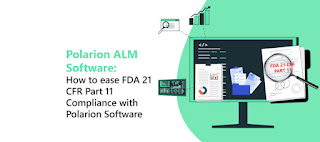Polarion Software
Polarion Software is a product lifecycle management (PLM) and application lifecycle management (ALM) solution that is used in various industries, including the life sciences sector. It is a comprehensive software platform designed to support the management of complex development and quality assurance processes, making it particularly valuable in life sciences for tasks such as regulatory compliance, quality control, and document management. Here are some ways in which Polarion Software is used in the life sciences industry:
1. Regulatory Compliance: Life sciences companies are subject to strict regulatory requirements, such as Good Manufacturing Practices (GMP) and Good Laboratory Practices (GLP). Polarion Software helps ensure compliance by enabling the creation, management, traceability of documents and data related to regulatory submissions and audits.
2. Quality Management: The software offers tools for quality assurance and management. It allows organizations to create and manage quality processes, procedures, and policies, ensuring that products and processes meet the necessary quality standards.
3. Document Management: In the life sciences industry, maintaining accurate and up-to-date documentation is critical. Polarion Software provides document management features that help organizations organize, control, and track documents, including standard operating procedures (SOPs), validation documents, and technical specifications.
4. Validation and Verification: Polarion Software supports validation and verification activities by providing a platform for creating and executing test plans, tracking test results, and managing validation documentation. This is crucial for ensuring that products and systems meet their intended requirements.
5. Collaboration: Collaboration and communication are essential in the life sciences industry, especially for cross-functional teams and geographically dispersed teams. Polarion Software facilitates collaboration by providing a central platform where teams can work on documents, projects, and tasks.
6. Change Management: The software helps in managing changes to documents, processes, and systems by providing workflows for change requests, reviews, and approvals. This ensures that changes are implemented in a controlled and compliant manner.
7. Electronic Signatures: Polarion Software typically supports electronic signatures, allowing authorized personnel to sign off on documents and records electronically in a compliant and auditable manner.
8. Traceability: Traceability is crucial in the life sciences industry. Polarion Software offers traceability features that allow organizations to link and track requirements, design, development, testing, and validation activities, ensuring transparency and accountability throughout the product development lifecycle.
9. Auditing and Reporting: The software provides audit trail capabilities and reporting tools, which are essential for regulatory audits and inspections. These features help organizations demonstrate compliance with regulatory standards and quality management practices.
10. Risk Management: Polarion Software can be used to identify, assess, and manage risks associated with product development and regulatory compliance, helping organizations make informed decisions and take appropriate actions to mitigate risks.
In summary, Polarion Software is
a versatile platform used in the life sciences industry to manage product
development, regulatory compliance, and quality assurance processes. It offers
a range of features to support the specific needs of this highly regulated sector
and helps organizations ensure product quality, safety, and compliance with
regulatory standards.
Citations:
Polarion ALM Software | How to ease FDA 21 CFR Part 11 Compliance? (complianceg.com)

Comments
Post a Comment